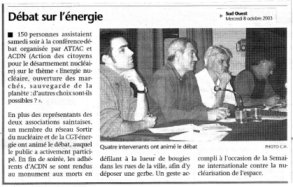 "On Saturday evening 150 people attended the lecture-debate organised by ATTAC and ACDN (Actions of Citizens for Nuclear Disarmament) on the theme ’Nuclear energy, opening of markets, safeguarding the planet - are there other options?’
"On Saturday evening 150 people attended the lecture-debate organised by ATTAC and ACDN (Actions of Citizens for Nuclear Disarmament) on the theme ’Nuclear energy, opening of markets, safeguarding the planet - are there other options?’
"Besides representatives of these two Saintes-based groups, a member of the ’Sortir du nucleaire’ (Out of the Nuclear Age) network and of CGT-Energy spoke in the debate, which included active public participation. At the end of the evening the members of ACDN made a candle-lit march to the Memorial to the Dead and laid a wreath. This action was taken to mark the International Week of opposition to the nuclearisation of space."
Let us add that the ACDN spokesperson, during his speech about "the military issues and the civilian risks of the nuclear option", drew attention to the fate of Mordecai Vanunu, the Israeli technician who has been languishing in prison for 17 years because he revealed to the English-speaking press the military purposes of Israel’s nuclear installation at Dimona, where he had worked. There is also an international campaign pressing for him to be released. This time last year, ACDN wrote to Israel’s ambassador in Paris in support of this campaign, but there has still been no reply. We continue to ask for Mordecai Vanunu’s freedom: since nuclear weapons are instruments for crimes against humanity, his stand does honour to the conscience of Israel. Besides, the 200-350 nuclear warheads which Israel is said to possess are a secret to nobody, and its former Minister of Foreign Affairs, Simon Peres has openly admitted that Israel is indeed a nuclear power.
Long before the facts discovered by the IAEA in Iraq and North Korea and its suspicions regarding other states like Iran, the case of Israel proved that nuclear research and its "peaceful" applications are frequently a cover and a means for acquiring military technology. This was the case for India and Pakistan. It was also, and still is, the case for France. The diffusion of nuclear technologies, encouraged by the Non-Proliferation Treaty and actively promoted by France, is in fact contributing to a military proliferation which the NPT is not managing to halt (although it was conceived for this purpose). This is made worse by the fact that the five official nuclear weapons states who signed it fail to respect their "unequivocal undertaking" made under article VI to proceed to the elimination of their own arsenals. In 2005 the NPT will have to be radically revised, so as to impose a strict respect for this undertaking, and so as to replace, for developing countries as for industrialised countries, the "right to peaceful uses of nuclear energy" with a "right to non-nuclear technologies and to renewable energy."
This very important question will be on the agenda of the second "Nuclear Disarmament Days" which will take place at Venissieux near Lyon (France) on October 24-26.